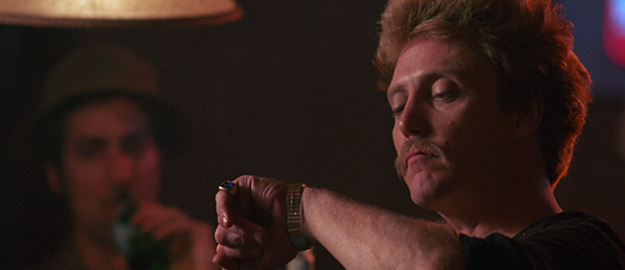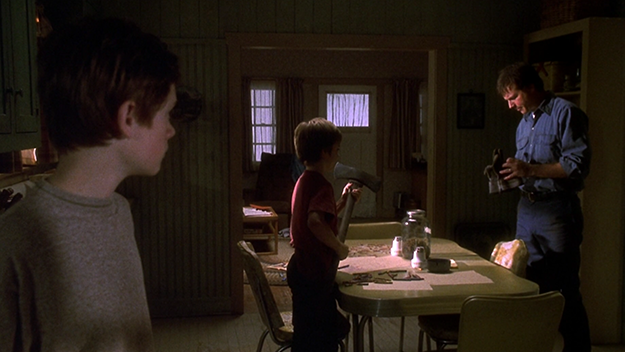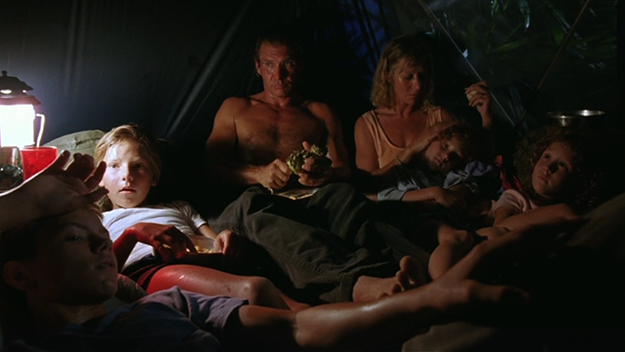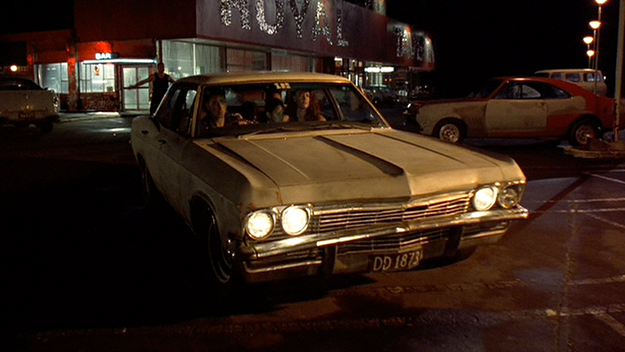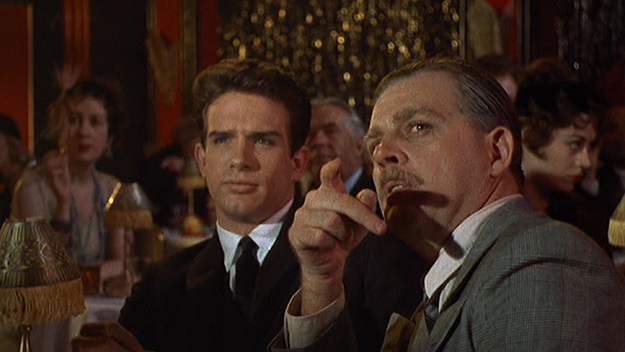To be fair, my dad did give me one thing: his passion for movies. So in honor of that gift, and with Father’s Day approaching, now seems like a good time to explore some of the worst dads in cinema history. (And it may go without saying, but they are in all cases terrible husbands as well.) Much breath and many words have been exhausted on analyzing the god-awful parenting techniques of Jack Nicholson’s axe-wielder Jack Torrance in The Shining; the daughter-raping Noah Cross (John Huston) in Chinatown; and the militant, abusive “Bull” Meecham (Robert Duvall) in The Great Santini. Ample consideration has also been given to the assorted sleazebags, drunkards, abusers, and family-destroyers found in ensemble films like Happiness, American Beauty, Magnolia, Affliction, The Squid and the Whale, and The Celebration; as well as to the more fantastical and cartoonish villains Darth Vader, John Milton (aka Satan) from The Devil’s Advocate, and Royal Tenenbaum. And let’s not leave out the atrocious surrogate father figures of Lolita, The Stepfather, This Boy’s Life, The Night of the Hunter, Firstborn, and There Will Be Blood, to name just a select few. Here are my picks for five less discussed, but no less horrible, flesh-and-blood fathers featured in some truly memorable, masterful films. [Please excuse the spoilers; it’s impossible to convey the full extent of these men’s atrocities without revealing key plot points.] Brad Sr. in At Close Range (James Foley, 1986) Upon first sight of Christopher Walken’s Brad Sr., with his coiffed hair, porn-star mustache, and smug face, it’s obvious he’s trouble. He abandoned his two sons Brad Jr. and Tommy (played by real-life brothers Sean and Chris Penn) early on, which already makes him despicable. But in this case, negligence would have been the better alternative, for when he reappears, their lives are transformed into a full-blown Greek tragedy. To the young men, stuck in dead-end existences in late-’70s rural Pennsylvania, the appeal of their dad’s unlawful ways is at first undeniable, a potential way out. They begin dabbling in low-level thievery, before being exposed to a whole lot worse. This example of a father as the purest evil (perfectly embodied by Walken) might have seemed far-fetched had this blisteringly grim, moody film not been based on an actual criminal family. Most Scarring Moments:
“Dad” in Frailty (Bill Paxton, 2001) A single father, known only as “Dad” throughout the film, at first appears to be a model parent. His wife died giving birth to their second son and he’s raised two well-behaved boys who love him dearly. They are a tightknit trio… until one night an angel pays Dad a visit, forever changing the family’s peaceful dynamic. Is he a messenger of the lord—called upon to help save the world by ridding it of demons hiding behind human form—or is he a raving lunatic? As he pursues what he adamantly believes to be his new calling, his younger, more impressionable son, Adam, supports his every move, while the older one, Fenton, resists, knowing his dad is, as he puts it, “not right in the head.” A devastating family drama wrapped in a twisty Gothic chiller, Frailty explores just how damaging the infliction of fanatical religious beliefs—and intense acts of violence—on the young and impressionable can be. Director-star Bill Paxton gives a layered, bone-chilling performance as a saint turned sinner and possible sire of a next generation of serial killers. Most Scarring Moments:
Allie Fox in The Mosquito Coast (Peter Weir, 1986) Obsession of another kind drives Allie Fox (Harrison Ford). Not a religious man in the conventional sense, it’s his own forceful, skewed beliefs that are his scripture—and eventually the cause of his family’s disintegration. A misunderstood genius inventor and vocally anti-American loudmouth, he speaks to his children as if they’re his peers and to everyone else as if they’re idiots, even his all-too-devoted wife he tellingly calls “Mom.” Despite his eccentricities, though, his four kids—particularly his oldest son Charlie (River Phoenix)—seem enamored of him. But when on a whim he decides to pack up the family and move to the Honduran jungle, without for a second taking into account their safety or wishes, a slow descent into misery begins. Once settled into their harsh new life, Allie, with Aguirre-like passion, refuses to let anything get in his way of the success of his new invention—a non-electric ice machine—even resorting to telling his children that America was destroyed in a nuclear disaster, to squash their desires of going home. Ford has done his finest work with director Peter Weir (see also Witness) and this may be the best, most dedicated performance of his career. Most Scarring Moments:
Jake Heke in Once Were Warriors (Lee Tamahori, 1994) Jake Heke is one fiercely passionate man. Somewhere deep down he loves his beautiful wife, Beth, and their five children, but he has way too many demons to express his feeling with kindness. Instead, wallowing in his insecurities—he is a descendant of slaves, while Beth comes from warriors; an imbalance he can’t get past—he drinks like crazy and behaves like a macho wild beast, acting out regularly with unpredictable rage. Life is rough all around for this Maori family, who face societal hardships and prejudices in modern Auckland, but Jake still takes the prize as the biggest threat. A brilliant, purely engrossing film—with stunning performances across the board—Once We Were Warriors will make you cry like a baby with every viewing. But even in all its devastation, unlike At Close Range this one ultimately leaves you more hopeful that the father can be escaped. Most Scarring Moments:
Ace Stamper in Splendor in the Grass (Elia Kazan, 1961) Elia Kazan’s heartrending, flawless film, written by William Inge, is not only a case study in the painful missed connections of first love but also in compromised parenting. Bud Stamper and Deanie Loomis (the too-perfect-for-words Warren Beatty and Natalie Wood) are the young couple hopelessly in love but torn apart by their uncertainty in what’s right and wrong, as inflicted on them by their parents and small-town society. Their parents too are victims of time and place—1928 in southeast Kansas—as well as their own dubious upbringings. Deanie’s mom is aggressive but well-meaning in her short-sightedness and her dad sweet but cowardly. Bud’s mom is treated as a bystander, and acts as one accordingly. But it’s his father, Ace (a staggering Pat Hingle), that is a true nightmare of parenting. An obnoxious, sexist bully, he is also a terrible listener and provider of the worst possible advice to his son, shattering his future and in large part responsible for the tragic emotional collapses of both Bud and Deanie, innocents now marred for life. When it comes down to it, money is really the only thing that matters to Ace, and he jumps out of a window when he loses everything in the stock market crash of 1929. Most Scarring Moments:
